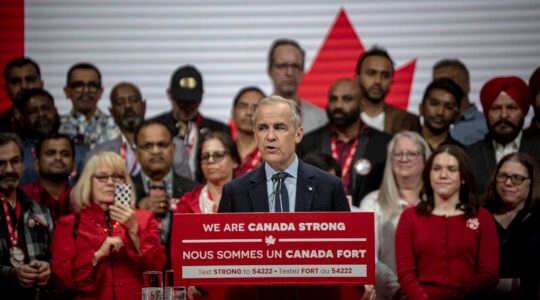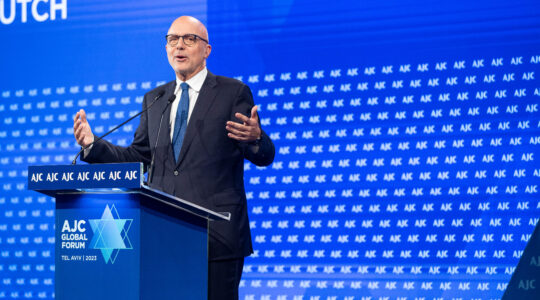BRUSSELS (JTA) — Israel has not accepted the Saudi peace initiative because the Arab League turned it into a take-it-or-leav
Amos Yadlin, who headed the Israel Defense Forces’ Military Intelligence Directorate for four years until 2010, made the statement during a public talk in Brussels on Monday with Turki bin Faisal Al Saud, director of the General Intelligence of Saudi Arabia from 1979 to 2001.
The Saudi, the youngest son of the late King Faisal, declined Yadlin’s invitation to Jerusalem and called it an appeal to emotion that distracted from the issue of reaching peace based on the Saudi initiative, also known as the Arab Peace Initiative.
“The real problem is that the Saudi initiative became the Arab League dictate in a summit in Beirut in 2002,” Yadlin said. “The Saudis modified it into a take-it-or-leave-it offer with parameters we can’t accept, mostly in the issue of returning the Golan to Syrians.”
The Israeli added that the settling of the Palestinian refugee problem also was a stumbling block.
Faisal Al Saud disputed Yadlin’s assertion and retorted that Israel should accept the proposal in principle, “and then negotiate on the details.”
The plan proposes normalization of ties between Israel and Arab League members in exchange for an Israeli withdrawal from all areas Israel captured in 1967 and a “just solution” to the Palestinian refugee issue that would be “agreed upon” by the parties.
“There is nothing under the table, no hidden agreement or underhanded move or secret clauses to it,” Faisal Al Saud said. “The Arabs will recognize Israel diplomatically, normalize relations and [end] hostilities in return for Israel withdrawing from all lands occupied in ’67.”
The meeting was organized by the German Marshall Fund as a follow-up to a public exchange in Munich four months ago between Faisal Al Saud and Israeli Justice Minister Tzipi Livni, Israel’s chief negotiator with the Palestinians.
The Saudi asked Livni why Israel did not follow up on the initiative, which Saudi Arabia presented in 2002.
Yadlin agreed to provide a reply in Brussels, according to Washington Post associate editor David Ignatius, who moderated the Brussels talks.
JTA has documented Jewish history in real-time for over a century. Keep our journalism strong by joining us in supporting independent, award-winning reporting.






